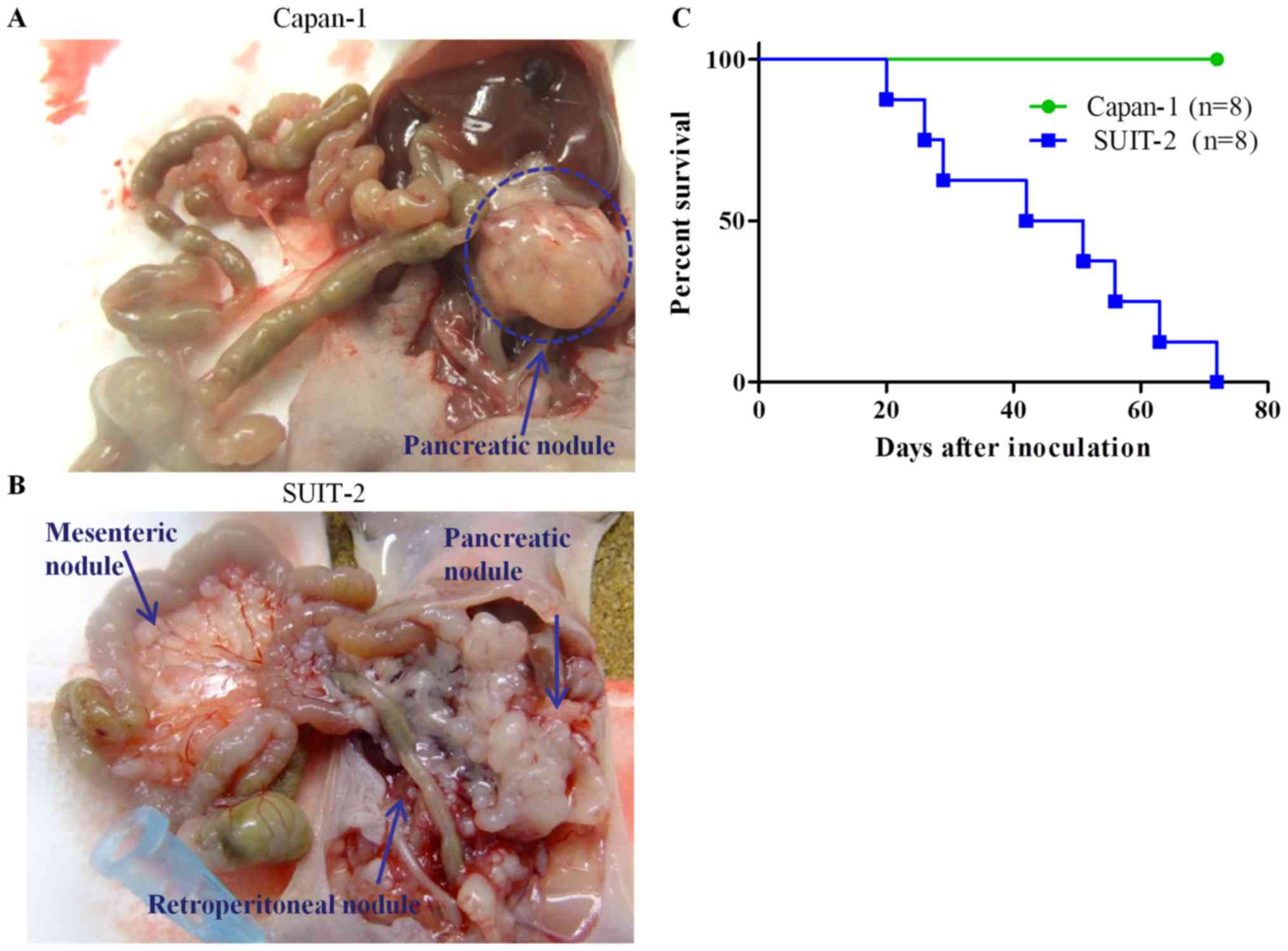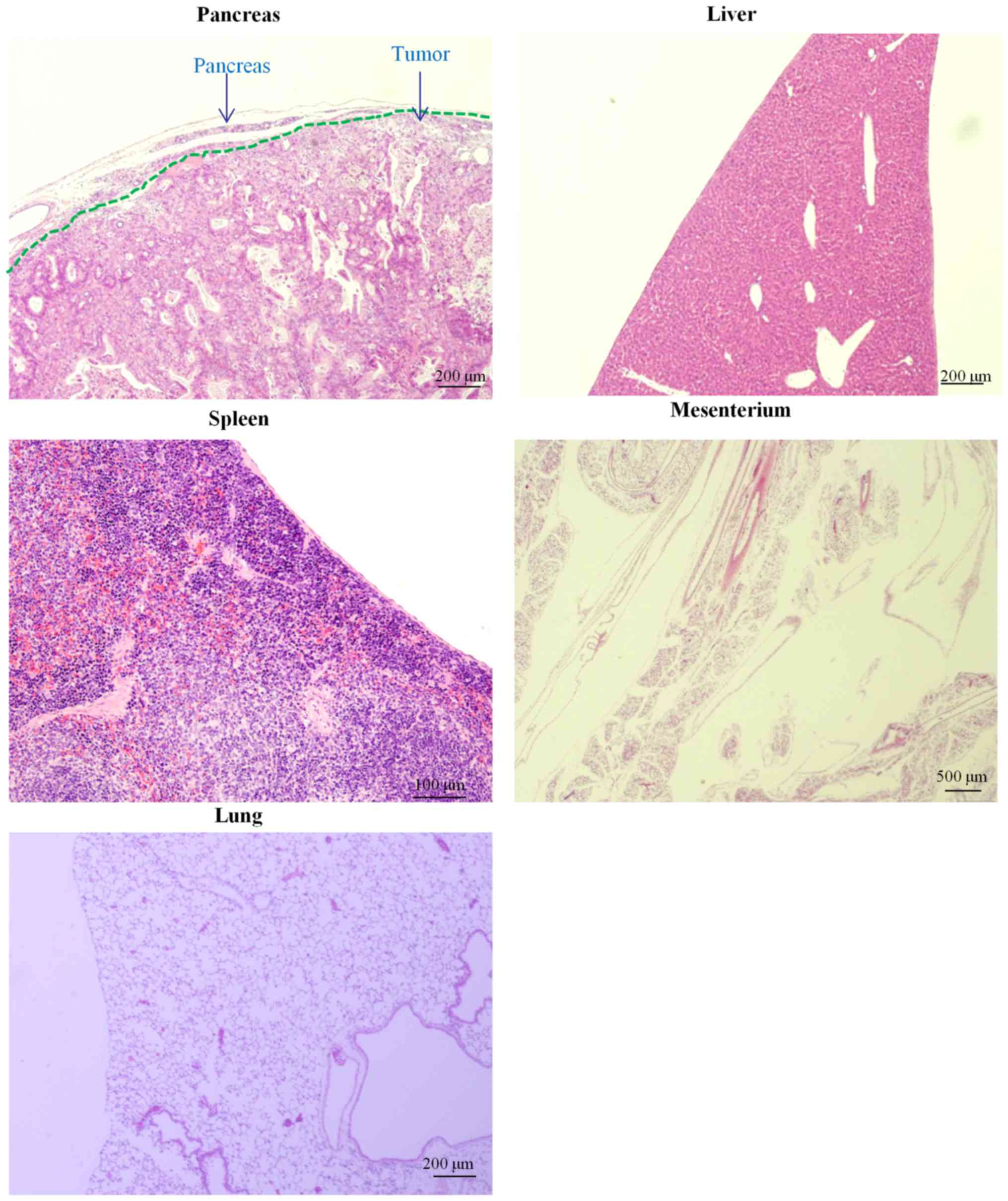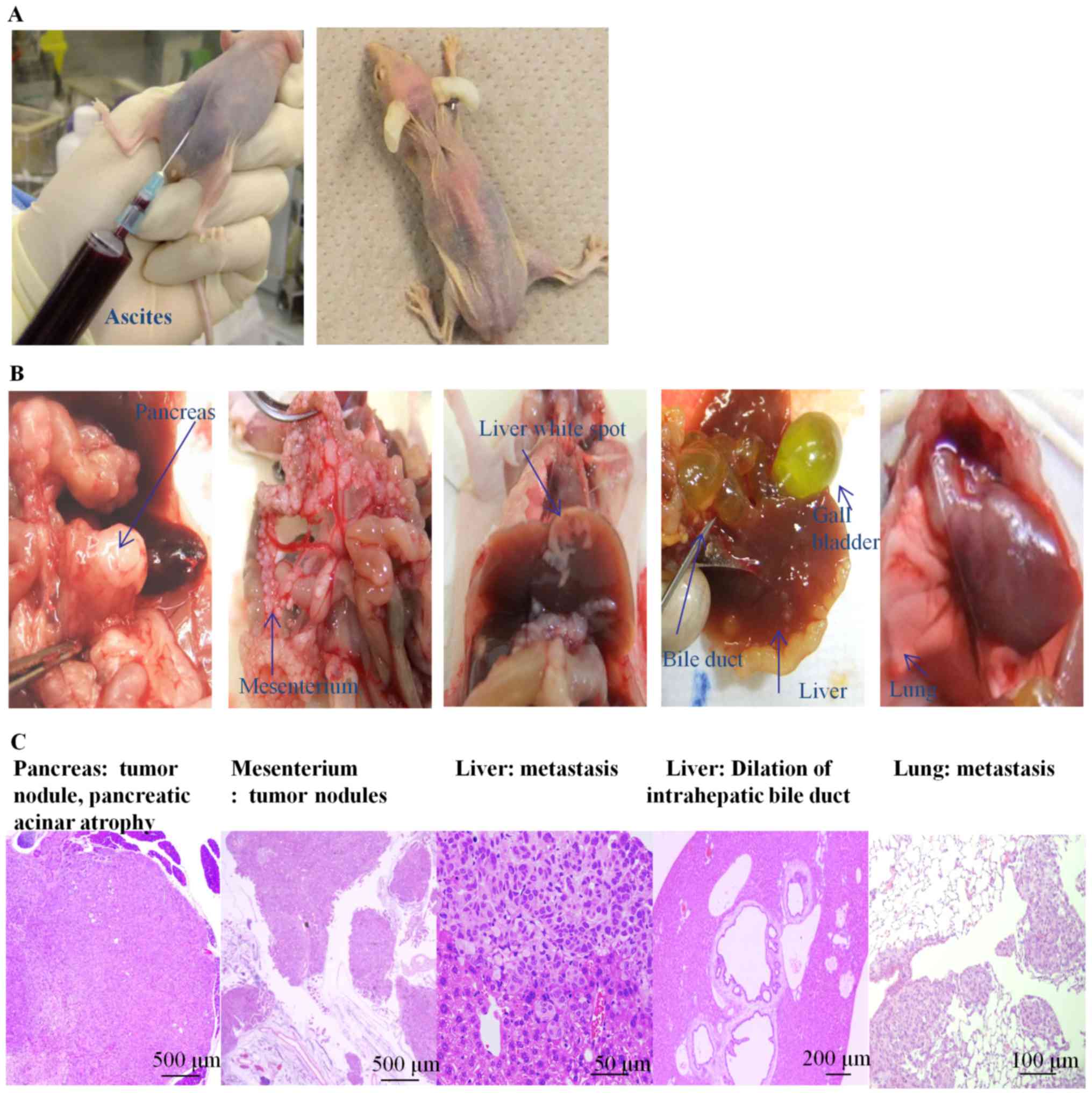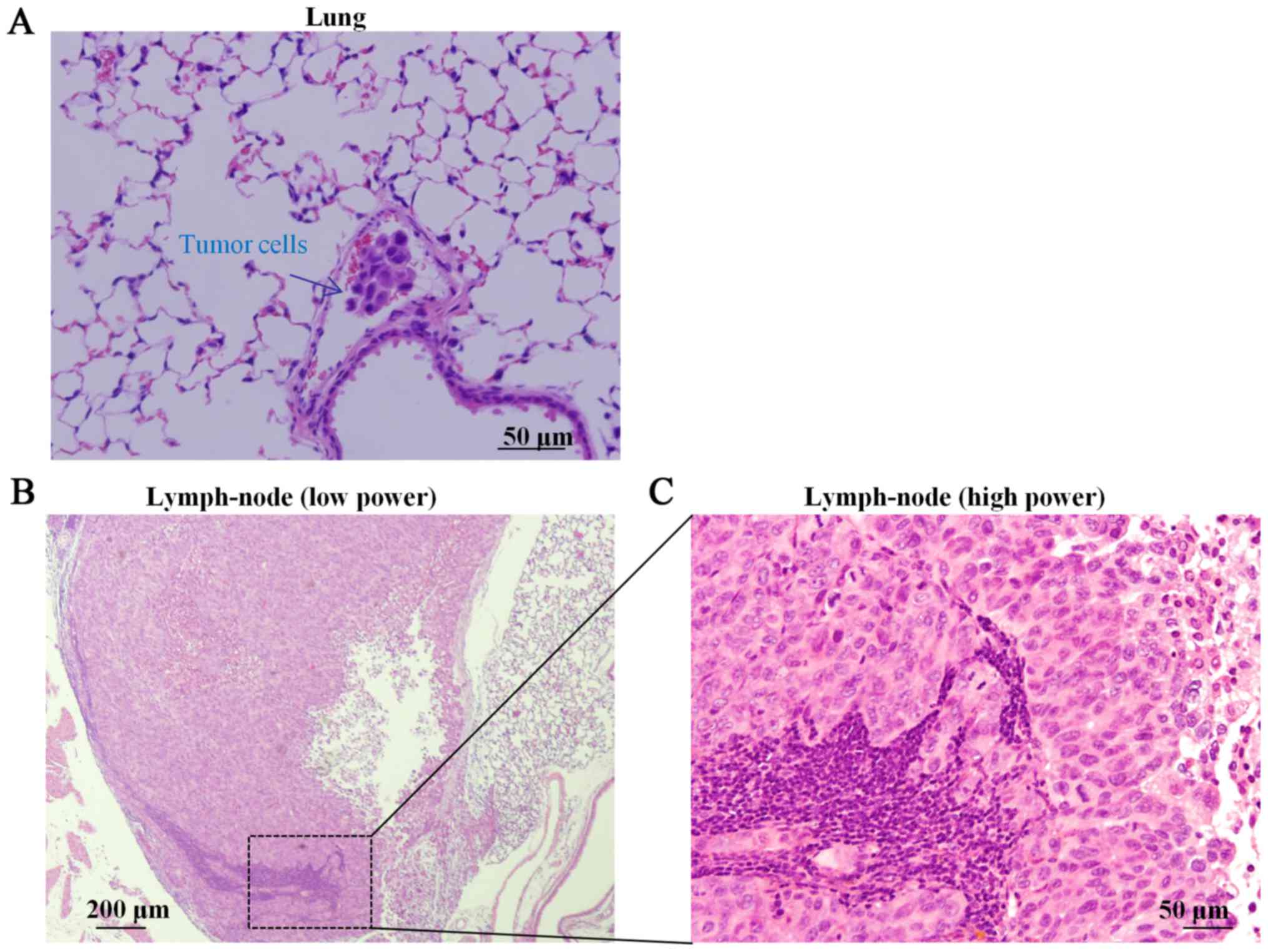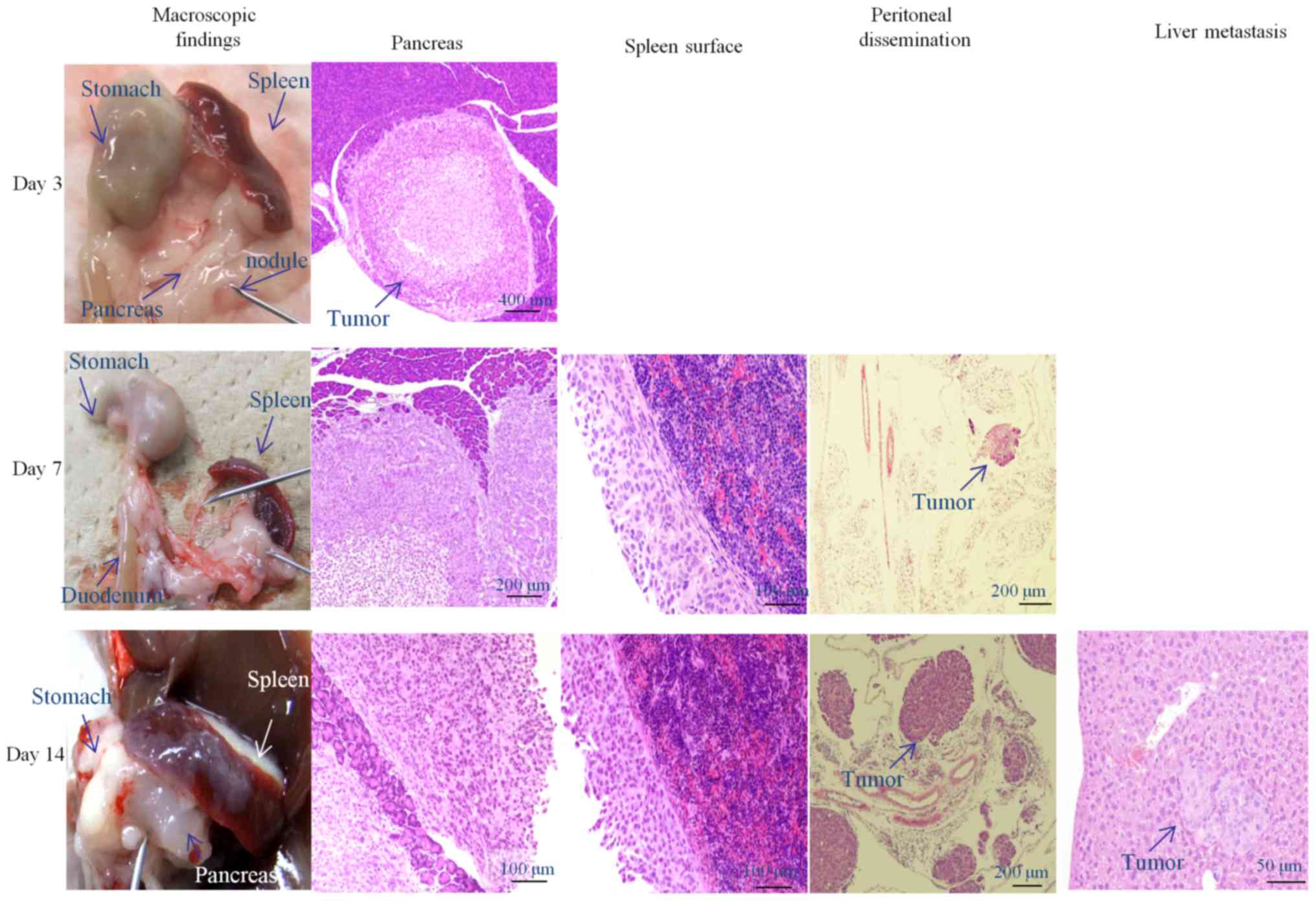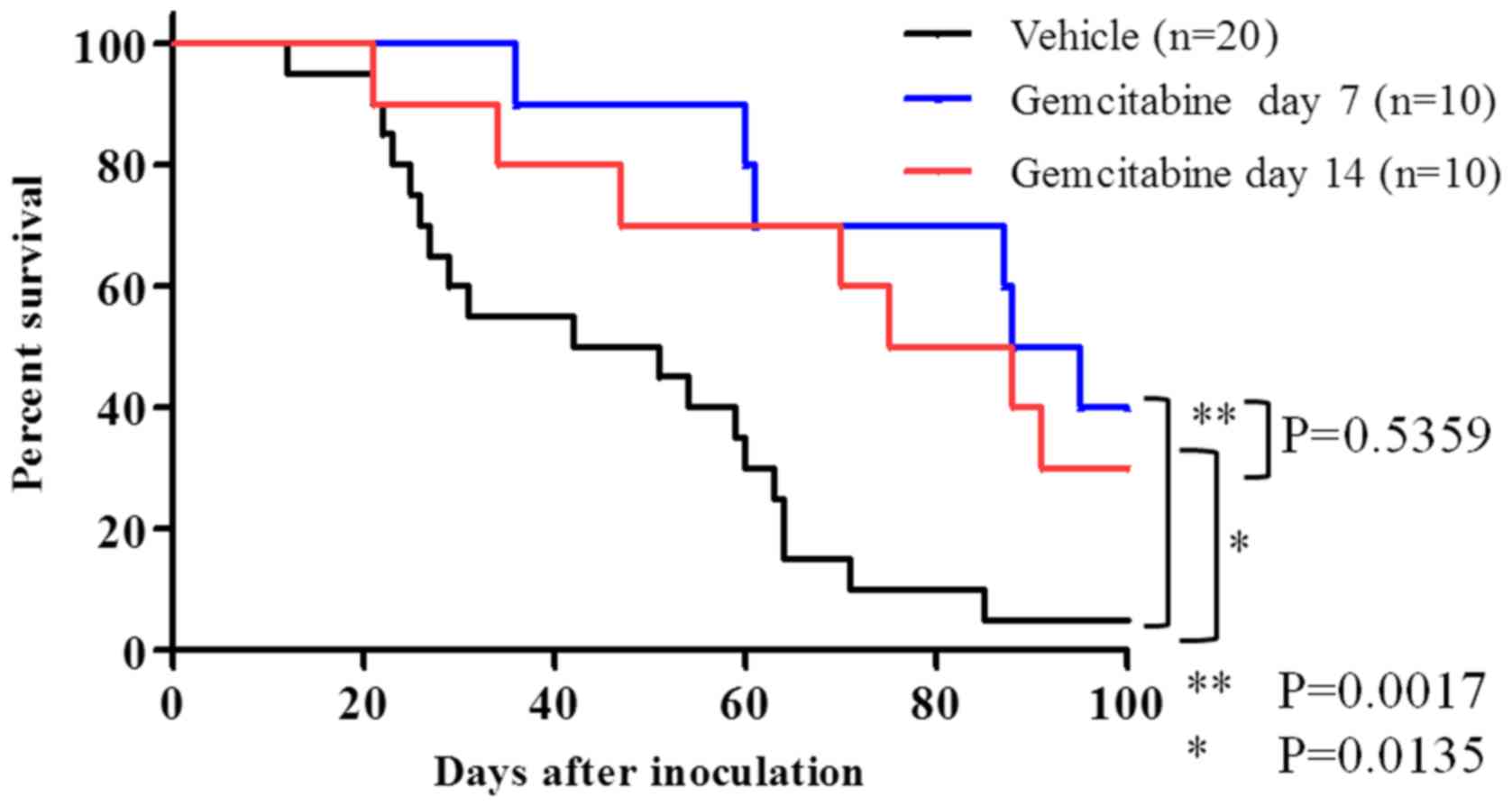|
1
|
Okusaka T, Matsumura Y and Aoki K: New
approaches for pancreatic cancer in Japan. Cancer Chemother
Pharmacol. 54 Suppl 1:S78–S82. 2004.PubMed/NCBI
|
|
2
|
Takahashi H, Ohigashi H, Gotoh K,
Marubashi S, Yamada T, Murata M, Ioka T, Uehara H, Yano M and
Ishikawa O: Preoperative gemcitabine-based chemoradiation therapy
for resectable and borderline resectable pancreatic cancer. Ann
Surg. 258:1040–1050. 2013. View Article : Google Scholar : PubMed/NCBI
|
|
3
|
Oberstein PE and Olive KP: Pancreatic
cancer: Why is it so hard to treat? Therap Adv Gastroenterol.
6:321–337. 2013. View Article : Google Scholar : PubMed/NCBI
|
|
4
|
Gnanamony M and Gondi CS: Chemoresistance
in pancreatic cancer: Emerging concepts. Oncol lett. 13:2507–2513.
2017. View Article : Google Scholar : PubMed/NCBI
|
|
5
|
Burris HA III, Moore MJ, Andersen J, Green
MR, Rothenberg ML, Modiano MR, Cripps MC, Portenoy RK, Storniolo
AM, Tarassoff P, et al: Improvements in survival and clinical
benefit with gemcitabine as first-line therapy for patients with
advanced pancreas cancer: A randomized trial. J Clin Oncol.
15:2403–2413. 1997. View Article : Google Scholar : PubMed/NCBI
|
|
6
|
Kapischke M and Pries A: Animal models of
pancreatic cancer for drug research. Expert Opin Drug Discov.
3:1177–1188. 2008. View Article : Google Scholar : PubMed/NCBI
|
|
7
|
Aguirre AJ, Bardeesy N, Sinha M, Lopez L,
Tuveson DA, Horner J, Redston MS and DePinho RA: Activated Kras and
Ink4a/Arf deficiency cooperate to produce metastatic pancreatic
ductal adenocarcinoma. Genes Dev. 17:3112–3126. 2003. View Article : Google Scholar : PubMed/NCBI
|
|
8
|
Bardeesy N, Aguirre AJ, Chu GC, Cheng KH,
Lopez LV, Hezel AF, Feng B, Brennan C, Weissleder R, Mahmood U, et
al: Both p16(Ink4a) and the p19(Arf)-p53 pathway constrain
progression of pancreatic adenocarcinoma in the mouse. Proc Natl
Acad Sci USA. 103:pp. 5947–5952. 2006; View Article : Google Scholar : PubMed/NCBI
|
|
9
|
Ma L and Saiyin H: LSL-KrasG12D;
LSL-Trp53R172H/+; Ink4flox/+; Ptf1/p48-Cre mice are an applicable
model for locally invasive and metastatic pancreatic cancer. PLoS
One. 12:e01768442017. View Article : Google Scholar : PubMed/NCBI
|
|
10
|
Hoang NT, Kadonosono T, Kuchimaru T and
Kizaka-Kondoh S: Hypoxia-inducible factor-targeting prodrug TOP3
combined with gemcitabine or TS-1 improves pancreatic cancer
survival in an orthotopic model. Cancer Sci. 107:1151–1158. 2016.
View Article : Google Scholar : PubMed/NCBI
|
|
11
|
Sun FX, Tohgo A, Bouvet M, Yagi S,
Nassirpour R, Moossa AR and Hoffman RM: Efficacy of camptothecin
analog DX-8951f (Exatecan Mesylate) on human pancreatic cancer in
an orthotopic metastatic model. Cancer Res. 63:80–85.
2003.PubMed/NCBI
|
|
12
|
Bouvet M, Wang J, Nardin SR, Nassirpour R,
Yang M, Baranov E, Jiang P, Moossa AR and Hoffman RM: Real-time
optical imaging of primary tumor growth and multiple metastatic
events in a pancreatic cancer orthotopic model. Cancer Res.
62:1534–1540. 2002.PubMed/NCBI
|
|
13
|
Ammons WS, Wang JW, Yang Z, Tidmarsh GF
and Hoffman RM: A novel alkylating agent, glufosfamide, enhances
the activity of gemcitabine in vitro and in vivo. Neoplasia.
9:625–633. 2007. View Article : Google Scholar : PubMed/NCBI
|
|
14
|
Tomioka D, Maehara N, Kuba K, Mizumoto K,
Tanaka M, Matsumoto K and Nakamura T: Inhibition of growth,
invasion, and metastasis of human pancreatic carcinoma cells by NK4
in an orthotopic mouse model. Cancer Res. 61:7518–7524.
2001.PubMed/NCBI
|
|
15
|
Metildi CA, Kaushal S, Hoffman RM and
Bouvet M: In vivo serial selection of human pancreatic cancer cells
in orthotopic mouse models produces high metastatic variants
irrespective of Kras status. J Surg Res. 184:290–298. 2013.
View Article : Google Scholar : PubMed/NCBI
|
|
16
|
Veerman G, Ruiz van Haperen VW, Vermorken
JB, Noordhuis P, Braakhuis BJ, Pinedo HM and Peters GJ: Antitumor
activity of prolonged as compared with bolus administration of
2′,2′-difluorodeoxycytidine in vivo against murine colon tumors.
Cancer Chemother Pharmacol. 38:335–342. 1996. View Article : Google Scholar : PubMed/NCBI
|
|
17
|
Cherubini G, Kallin C, Mozetic A,
Hammaren-Busch K, Müller H, Lemoine NR and Halldén G: The oncolytic
adenovirus AdΔΔ enhances selective cancer cell killing in
combination with DNA-damaging drugs in pancreatic cancer models.
Gene Ther. 18:1157–1165. 2011. View Article : Google Scholar : PubMed/NCBI
|
|
18
|
Kizaka-Kondoh S, Itasaka S, Zeng L, Tanaka
S, Zhao T, Takahashi Y, Shibuya K, Hirota K, Semenza GL and Hiraoka
M: Selective killing of hypoxia-inducible factor-1-active cells
improves survival in a mouse model of invasive and metastatic
pancreatic cancer. Clin Cancer Res. 15:3433–3441. 2009. View Article : Google Scholar : PubMed/NCBI
|
|
19
|
Saimura M, Nagai E, Mizumoto K, Maehara N,
Okino H, Katano M, Matsumoto K, Nakamura T, Narumi K, Nukiwa T and
Tanaka M: Intraperitoneal injection of adenovirus-mediated NK4 gene
suppresses peritoneal dissemination of pancreatic cancer cell line
AsPC-1 in nude mice. Cancer Gene Ther. 9:799–806. 2002. View Article : Google Scholar : PubMed/NCBI
|
|
20
|
Houghton JL, Zeglis BM, Abdel-Atti D,
Aggeler R, Sawada R, Agnew BJ, Scholz WW and Lewis JS:
Site-specifically labeled CA19.9-targeted immunoconjugates for the
PET, NIRF, and multimodal PET/NIRF imaging of pancreatic cancer.
Proc Natl Acad Sci USA. 112:pp. 15850–15855. 2015; View Article : Google Scholar : PubMed/NCBI
|
|
21
|
Takiguchi S, Inoue K, Matsusue K, Furukawa
M, Teramoto N and Iguchi H: Crizotinib, a MET inhibitor, prevents
peritoneal dissemination in pancreatic cancer. Int J Oncol.
51:184–192. 2017. View Article : Google Scholar : PubMed/NCBI
|
|
22
|
Fukushima T, Kawaguchi M, Yamasaki M,
Tanaka H, Yorita K and Kataoka H: Hepatocyte growth factor
activator inhibitor type 1 suppresses metastatic pulmonary
colonization of pancreatic carcinoma cells. Cancer Sci.
102:407–413. 2011. View Article : Google Scholar : PubMed/NCBI
|
|
23
|
Beltran PJ, Mitchell P, Chung YA, Cajulis
E, Lu J, Belmontes B, Ho J, Tsai MM, Zhu M, Vonderfecht S, et al:
AMG 479, a fully human anti-insulin-like growth factor receptor
type I monoclonal antibody, inhibits the growth and survival of
pancreatic carcinoma cells. Mol Cancer Ther. 8:1095–1105. 2009.
View Article : Google Scholar : PubMed/NCBI
|
|
24
|
Gaya A and Tse V: A preclinical and
clinical review of aflibercept for the management of cancer. Cancer
Treat Rev. 38:484–493. 2012. View Article : Google Scholar : PubMed/NCBI
|
|
25
|
Bruns CJ, Harbison MT, Kuniyasu H, Eue I
and Fidler IJ: In vivo selection and characterization of metastatic
variants from human pancreatic adenocarcinoma by using orthotopic
implantation in nude mice. Neoplasia. 1:50–62. 1999. View Article : Google Scholar : PubMed/NCBI
|
|
26
|
Ishikawa F, Yasukawa M, Lyons B, Yoshida
S, Miyamoto T, Yoshimoto G, Watanabe T, Akashi K, Shultz LD and
Harada M: Development of functional human blood and immune systems
in NOD/SCID/IL2 receptor {gamma} chain(null) mice. Blood.
106:1565–1573. 2005. View Article : Google Scholar : PubMed/NCBI
|
|
27
|
Shultz LD, Ishikawa F and Greiner DL:
Humanized mice in translational biomedical research. Nat Rev
Immunol. 7:118–130. 2007. View
Article : Google Scholar : PubMed/NCBI
|















